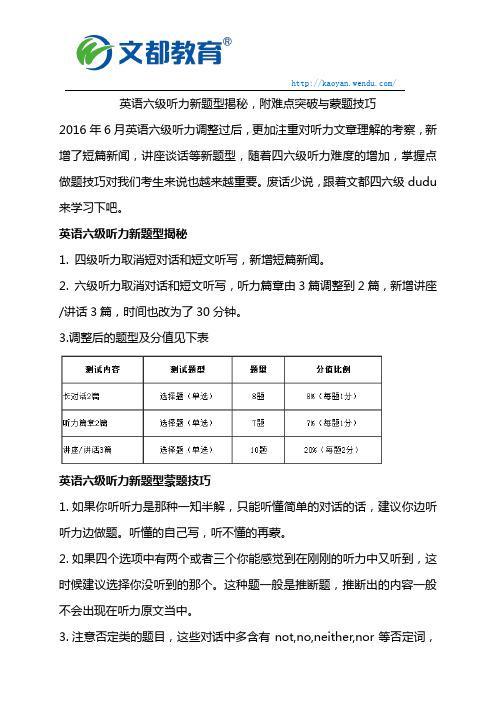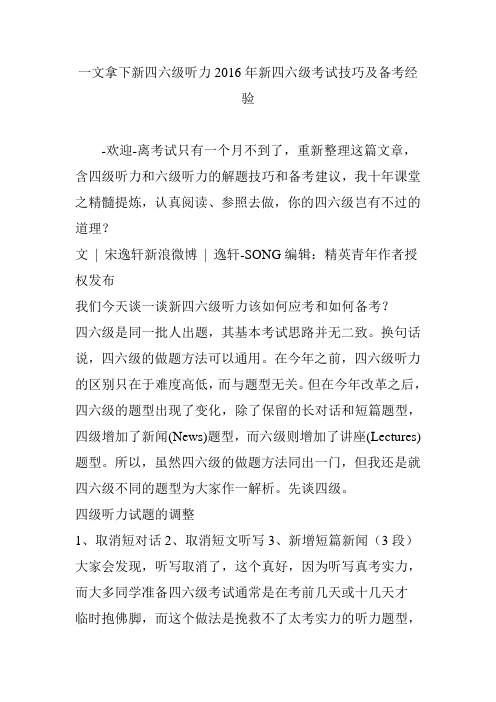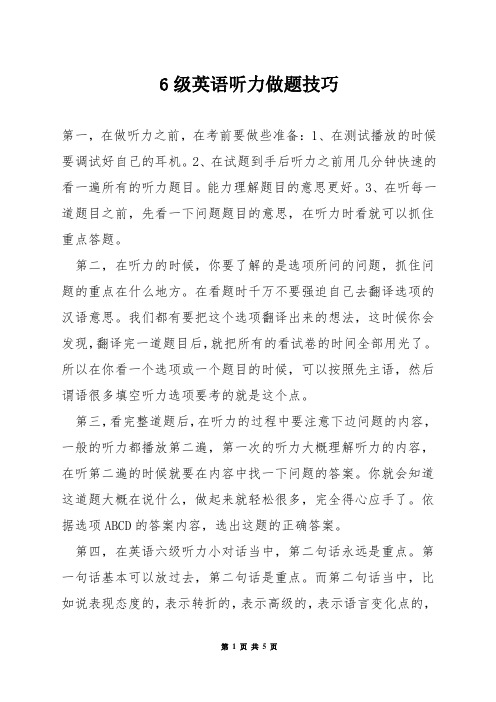2016年大学英语六级听力新题型解题思路
英语六级听力新题型揭秘,附难点突破与蒙题技巧

/英语六级听力新题型揭秘,附难点突破与蒙题技巧2016年6月英语六级听力调整过后,更加注重对听力文章理解的考察,新增了短篇新闻,讲座谈话等新题型,随着四六级听力难度的增加,掌握点做题技巧对我们考生来说也越来越重要。
废话少说,跟着文都四六级dudu 来学习下吧。
英语六级听力新题型揭秘1. 四级听力取消短对话和短文听写,新增短篇新闻。
2. 六级听力取消对话和短文听写,听力篇章由3篇调整到2篇,新增讲座/讲话3篇,时间也改为了30分钟。
3.调整后的题型及分值见下表英语六级听力新题型蒙题技巧1.如果你听听力是那种一知半解,只能听懂简单的对话的话,建议你边听听力边做题。
听懂的自己写,听不懂的再蒙。
2.如果四个选项中有两个或者三个你能感觉到在刚刚的听力中又听到,这时候建议选择你没听到的那个。
这种题一般是推断题,推断出的内容一般不会出现在听力原文当中。
3.注意否定类的题目,这些对话中多含有not,no,neither,nor等否定词,/也有but,although等转折词,或由would rather,too...to结构及虚拟语气等表达。
要注意这些答案表达的都是否定含义,所以如果你看到了和你听到原文基本相同的语句,但是多了一个上述词汇,一定要首先排除,然后你把否定词删去,找其余答案中跟这句话意思相近的,基本就是正确答案了。
4.如果一题的答案中有两个答案是近似的,只有一个单词或者短语不同,那么你可排除其余答案,再看这两个答案中的中心单词有没有和你排除的两个答案中重复的,如果有的话,你基本可以锁定那个正确答案了。
5.有些听力实在不好,听了还不如不听的,建议还是不要浪费时间了,多留点时间给后面的题,提高后面题的准确性是更好的选择。
完全不听听力来蒙题的话大部分题只能给你排除一些选项。
英语四六级想过找文都。
2016年大学英语六级听力新题型解题思路

22.A) Appropriated funds to promote research of nutrient-rich foods. B) Encouraged breastfeeding for the first six months of a child’s life. C) Recruited volunteers to teach rural people about health and nutrition. D) Targeted hunger-relief programs at pregnant women and young children.
词性转换,语序调整
(表达转换)
21 Says IFPRI’s Marie Ruel, “They will be more likely to perform well in school. They will stay in school longer. And then at adulthood, IFPRI has actually demonstrated that children who were better nourished have higher wages, by a pretty large margin, by 46 percent.” Ruel says that means the productivity of a nation’s future generations depends in a large part on the first 1,000 days of life. “This is why we’re all on board in focusing on those thousand days to improve nutrition. After that, the damage is done and is highly irreversible.” have higher wages / get better pay. 同(近)义的表达
一文拿下新四六级听力2016年新四六级考试技巧及备考经验

一文拿下新四六级听力2016年新四六级考试技巧及备考经验-欢迎-离考试只有一个月不到了,重新整理这篇文章,含四级听力和六级听力的解题技巧和备考建议,我十年课堂之精髓提炼,认真阅读、参照去做,你的四六级岂有不过的道理?文| 宋逸轩新浪微博| 逸轩-SONG编辑:精英青年作者授权发布我们今天谈一谈新四六级听力该如何应考和如何备考?四六级是同一批人出题,其基本考试思路并无二致。
换句话说,四六级的做题方法可以通用。
在今年之前,四六级听力的区别只在于难度高低,而与题型无关。
但在今年改革之后,四六级的题型出现了变化,除了保留的长对话和短篇题型,四级增加了新闻(News)题型,而六级则增加了讲座(Lectures)题型。
所以,虽然四六级的做题方法同出一门,但我还是就四六级不同的题型为大家作一解析。
先谈四级。
四级听力试题的调整1、取消短对话2、取消短文听写3、新增短篇新闻(3段)大家会发现,听写取消了,这个真好,因为听写真考实力,而大多同学准备四六级考试通常是在考前几天或十几天才临时抱佛脚,而这个做法是挽救不了太考实力的听力题型,尤其是听写。
而如今听写取消了,等于帮了各位大忙,省去了死记硬背单词的煎熬。
另外,短对话取消了,这个看起来不可思议,其实并不意外,因为无论是国内的专四八,还是国外的托福雅思,早些年就不考短对话了。
四六级这次终于痛下决心砍去这个题型,四级替换成了3段短篇新闻,新闻题型其实是今年专四改革前的最后一部分题型,公共英语考试借鉴英语专业考试,真有向专业致敬的意思。
分值不太大,7%,相当于之前的长对话分值。
现在的长对话增加了1%的分值,其实不过为了凑分值。
篇章还是3篇,分值是10%,现在题量不变,但分值却增长到了20%,翻了一倍。
这是好事,因为我在课上讲过,之前的听力考试最难的部分是听写,其次做题较为复杂的是短对话,而听完课提分最快的是长对话和短篇,也就是我说的“段子题”,因为技巧显著,使用起来较易上手。
教你轻松应对改革后六级听力新题型

教你轻松应对改革后六级听力新题型
2016四六级改革之后,六级最大的变化就是听力部分增加的讲座和讲话。
下面是准备出来的一些六级考试听力部分的应对策略,希望对大家有帮助噢!
1. 词汇积累:除了原本六级听力高频词汇之外,同学们还可以开始对于托福听力的高频词汇进行一定的积累和背诵。
2. 时间分配:每天至少40分钟专攻听力
听力能力的提高是个潜移默化的过程,“三分练,七分养”。
因此,在准备六级听力的过程中,最重要的是保证每天都有听英语。
建议每天抽出40分钟时间专攻听力,新闻,综艺节目,有声读物或者电影等,利用能飞英语视听软件,进行精听精学,保证一定的注意力集中,沉浸在英文环境中。
3.掌握Lecture规律:同样作为正式文章,讲座/讲话的内容逻辑性强,结构清晰。
同学们在听题的过程中,明确内容的逻辑结构,对于提高正确率有很大的帮助。
通常,开篇会进行背景介绍以及话题引入;在正式的内容中,会从当前情况、面临问题、解决方法、未来展望等方面铺展开。
同学们。
6级英语听力做题技巧

6级英语听力做题技巧第一,在做听力之前,在考前要做些准备:1、在测试播放的时候要调试好自己的耳机。
2、在试题到手后听力之前用几分钟快速的看一遍所有的听力题目。
能力理解题目的意思更好。
3、在听每一道题目之前,先看一下问题题目的意思,在听力时看就可以抓住重点答题。
第二,在听力的时候,你要了解的是选项所问的问题,抓住问题的重点在什么地方。
在看题时千万不要强迫自己去翻译选项的汉语意思。
我们都有要把这个选项翻译出来的想法,这时候你会发现,翻译完一道题目后,就把所有的看试卷的时间全部用光了。
所以在你看一个选项或一个题目的时候,可以按照先主语,然后谓语很多填空听力选项要考的就是这个点。
第三,看完整道题后,在听力的过程中要注意下边问题的内容,一般的听力都播放第二遍,第一次的听力大概理解听力的内容,在听第二遍的时候就要在内容中找一下问题的答案。
你就会知道这道题大概在说什么,做起来就轻松很多,完全得心应手了。
依据选项ABCD的答案内容,选出这题的正确答案。
第四,在英语六级听力小对话当中,第二句话永远是重点。
第一句话基本可以放过去,第二句话是重点。
而第二句话当中,比如说表现态度的,表示转折的,表示高级的,表示语言变化点的,就是语调变化点的,就是我们的重点。
所以在听力的时候要有技巧的抓住重点。
第五,长对话和短文听力也是有一些方法的,长对话和短文听力一开始第一句话非常重要。
往往第一句话就概括文章的内容。
长对话和短文听力也是有一些方法的在不仅开始第一句话非常重要。
而且,结束的最后一句话也很重要。
主要是抓文章的要点。
第六、在听长篇对话和短文时听力时,如果听到很难的词汇自己不知道的时候,不要钻牛角尖冥思苦想停留在哪儿,这个时候你的看着选项,选项中大部分单词在文段出现的时候,这个选项一般就是对的了。
掌握了正确的六级听力技巧,相信考试的一定会得心应手。
2英语六级做题技巧每年都会有题型变动说明,首先要做的就是要了解题型,不错,研究一下分值安排,好知道自己哪方面必须要更多的努力,让努力不会白白浪费。
2016大学英语六级听力做题方法

2016大学英语六级听力做题方法来源:智阅网大学英语六级听力还是有一定难度的。
所以,需要我们在平时认真复习,并总结出做题方法和技巧,这样才能在考试中,取得令自己满意的成绩。
那么,大学英语六级听力的做法又有哪些?首先,在做题目之前,你要了解的是选项,通过选项就会发现这道题的重点在什么地方。
你需要关注的是选项的不同点,而且看选项的时候,要千万记住:横着看选项永远没有竖着看选项快!而且千万不要强迫自己去翻译选项的汉语意思。
我们都有要把这个选项翻译出来的想法,这时候你会发现,翻译完一道题目后,就把所有的看试卷的时间全部用光了。
这种情况怎么办?要注意,看一个选项或一个题目的时候,竖着看,首先是主语,然后关注它的谓语就可以了。
很多选项的不同点就是从谓语差别开始的。
看完整道题后,你就会知道这道题大概在说什么,于是就会有的放矢一些。
第二,英语六级听力小对话当中,第二句话永远是重点。
第一句话基本可以放过去,第二句话是重点。
而第二句话当中,比如说表现态度的,表示转折的,表示最高级的,表示语言变化点的,就是语调变化点的,就是我们的重点。
第三,长对话和短文听力也是有一些方法的,比如说一开始第一句话非常重要。
而且,结束的最后一句话也很重要。
相同道理,转折的位置,语调变化的位置,最高级的位置,情态动词的位置,都是一些非常重要的位置。
在做长对话和短文听力时,如果听到的词汇都很难的时候,你的眼睛一定要盯着选项,当发现选项中大部分单词都已经被读出的时候,这个选项一般就是对的。
希望我们再通过2016《大学英语六级考试真题精析与标准预测》,巩固我们对于听力及真题出题规律和做题方法的掌握。
想买这本书的同学,可以去智阅网上看看,最近智阅网上,有很多购书优惠,可以让我们尽情享受质优价廉的购书体验。
新题型六级听力理解解题技巧

长对话的谈话双方会就某一个话题进行多个回合的交流,信息量更多,人物态 度、语气、情感变化更复杂。提问的方式与短对话相同,考生应在答题前快速浏 览选项,大致推测 对话发生的情景。听时做好笔记,记录对话中的数字、人名、 地名,表示观点的标示词,重复率高的词或词组,表示因果、转折、比较及其他
重要标示词。
信息题(主要有 两种考法:一种是对话中出现多种数字,需要考生辨别哪个是正 确答案,一种是需要明 确各个数量之间的关系,进行简单的计算)。请求建议题
(通常请求或建议由第二个speaker提出),观点态度题(考查对话一方的态度、 立场、观点、评价等,可以通过对 句子的理解和语调的把握进行推断)。谈话主 旨题、细节辨认题等。
的语言基础指的是熟练掌握语音、语法、基本词汇以及常用句型,包括口语中 的一些习惯表达方
法。
1•语音:包括辨音、音变、句重音等方面。
1辨别音素是学生突破听力理解的第一关,不能正确辨音(这往往是自己发音 不准所致),极易
导致听力理解上的错误。例如:
The professor collected the papers himself.
Mum:So you 'have passed
have作为助动词本不应重读,但这里却带有句重音,言外之意是:我原来以
为你不会及格”。
4语调
同一个句子,语调不同含义就会出现差异,这也是常有的现象,必须引起考生 的重视。例
女口:A burglar broke into his\house last ri ght
B Tell Mark to cook his own food.
C Tell Mark to put up with choices he makes.
2016年英语六级听力考试经验

2016年英语六级听力考试经验听力是英语六级考试的重要组成部分,许多同学都感到听力很难,无从下手,今天,小编就为大家介绍一些六级听力的考试经验,希望能够帮助大家攻克难关。
1、首先要做好心理准备。
紧张不利于理解,只有放松情绪,听觉器官才能对声音信号作出敏感的反映,进而提高思维理解能力。
因此如果考前感到紧张,不妨做一下深呼吸或想些与考试无关的事情。
这样就很容易把精力集中起来,从而取得良好的听力效果。
2、理解好题意,做到心中有数。
刚发下试卷的时候,首先应该把题中所问的问题大体浏览一遍,作到心中有数,这样做的好处是:第一,可以判断所听内容,第二,依据上下文有助于预测答案。
这样在听录音的时候,我们就可以不免紧张,可以有针对性的去听,寻找有效信息。
这是做听力题的首要前提。
如果在考试开始就过度紧张而忽视了题意,就会造成本应该完成得非常好的题从手中错过。
降低做题效率。
3、抢用短文,预测听写内容。
听写的短文一般在100-200字左右,共重复三遍。
考生可利用听指令前的空隙,略看一下短文,做到"有的放矢"。
去年6月份大学英语四级考试中的听写文章:考生扫一眼便会知道是一篇关于policeman和他们的job的事,这样就不会措手不及,心慌意乱,影响正常水平的发挥了。
4、使用速记方法,从文中找出答案。
一定要避免只顾记下听写的第一单词,而后面的几句后匆匆而过,来不及填写第二个空的情况针。
我认为在考试中应采用速记方法,迅速记下每个听到的单词。
所说的速记就是用一些简单的符号。
缩写、字母记下所听到的内容,不让每个单词漏网。
5、综合多种技能和技巧来理解语篇寻求答案。
(1)阅读技巧:应用平行结构预测所填内容(2)写作技巧:英文短篇的首句通常为topic sentence,注意此句的理解有助于听出下文空缺。
(3)key word通过关键词可预测答案(4)熟悉语法结构、句式等有益于听写。
(5)听话听音:speaker的语音、语词、语气等都是很好的暗示,要充分利用。
- 1、下载文档前请自行甄别文档内容的完整性,平台不提供额外的编辑、内容补充、找答案等附加服务。
- 2、"仅部分预览"的文档,不可在线预览部分如存在完整性等问题,可反馈申请退款(可完整预览的文档不适用该条件!)。
- 3、如文档侵犯您的权益,请联系客服反馈,我们会尽快为您处理(人工客服工作时间:9:00-18:30)。
Now listen to the following recording and answer questions 20 to 22. 20. A) It seriously impacts their physical and mental development. B) It has become a problem affecting global economic growth. C) It is a common problem found in underdeveloped countries. D) It is an issue often overlooked by parents in many countries.
2016年大学英语 六级考试 听力新题型详解
2016.4
四级听力试题的调整
1、取消短对话 2、取消短文听写
ห้องสมุดไป่ตู้
3、增短篇新闻(3段)
其余测试内容不变,试题结构如下:
六级听力题型的调整
1.取消短对话
2.取消短文听写 3.新增讲座/讲话(3篇) recordings or lectures 4.听力篇章调整为2篇(原3篇) 其余测试内容不变,试题结构如下:
16
Moderator: Hello Ladies and Gentleman, it gives me great pleasure to introduce our keynote speaker for today’s session, Dr. Howard Miller. Dr. Miller, Professor of Sociology at Washington University, has written numerous articles and books on the issues facing older Americans in our graying society for the past 15 years. older Americans / senior citizens 同义词(组)置换
For them and some older Americans, their so-called “golden years” are at times not so pleasant, for this period can mean the decline of not only one’s health but the loss of identity and self-worth. In many societies, this self-identity is closely related with our social status, occupation, material possessions, or independence. Furthermore, we often live in societies that value what is “new” or in fashion, and our own usage of words in the English language is often a sign of bad news for older Americans. I mean how would your family react if you came home tonight exclaiming, “Hey, come to the living room and see the OLD black and white TV I brought!” Unfortunately, the word “old” calls to mind images of the need to replace or discard. 18 原文未变
Several years ago when my grandparents were well into their eighties, they were faced with the reality of no longer being able to adequately care for themselves. My grandfather spoke of his greatest fear, that of leaving the only home they had known for the past 60 years. Fighting back the tears, he spoke proudly of the fact that he had built their home from the ground up, and that he had pounded every nail and laid every brick in the process. The prospect of having to sell their home and give up their independence, and move into a retirement home was an extremely painful experience for them. It was, in my grandfather’s own words, like having a limb cut off. He exclaimed in a forceful manner that he felt he wasn’t important anymore. 17 the home he had lived in for 60 years.同(近)义的表达
21. A) They will live longer. B) They get better pay. C) They get along well with people. D) They develop much higher IQs.
22.A) Appropriated funds to promote research of nutrient-rich foods. B) Encouraged breastfeeding for the first six months of a child’s life. C) Recruited volunteers to teach rural people about health and nutrition. D) Targeted hunger-relief programs at pregnant women and young children.
词性转换,语序调整
(表达转换)
21 Says IFPRI’s Marie Ruel, “They will be more likely to perform well in school. They will stay in school longer. And then at adulthood, IFPRI has actually demonstrated that children who were better nourished have higher wages, by a pretty large margin, by 46 percent.” Ruel says that means the productivity of a nation’s future generations depends in a large part on the first 1,000 days of life. “This is why we’re all on board in focusing on those thousand days to improve nutrition. After that, the damage is done and is highly irreversible.” have higher wages / get better pay. 同(近)义的表达
Now, many of the lectures given at this conference have focused on the issues of pension reform, medical care, and the development of public facilities for senior citizens. And while these are vital issues that must be addressed, I’d like to focus my comments on an important issue that will affect the overall success of the other programs mentioned. This has to do with changing our perspectives on what it means to be a part of this group, and finding meaningful roles the elderly can play and should play in our societies. 19 Finding meaningful roles for the elderly in society. 原文词序变化,减词
The 2010 Global Hunger Index report was released today by the International Food Policy Research Institute (IFPRI). It notes that, in recent years, experts have come to the conclusion that undernourishment between conception and a child’s second birthday can have serious and long-lasting impacts. Undernourishment during this approximately 1,000-day window can seriously check the growth and development of children and render them more likely to get sick and die than well-fed children. Preventing hunger allows children to develop both physically and mentally. 20 It seriously impacts their physical and mental development.
